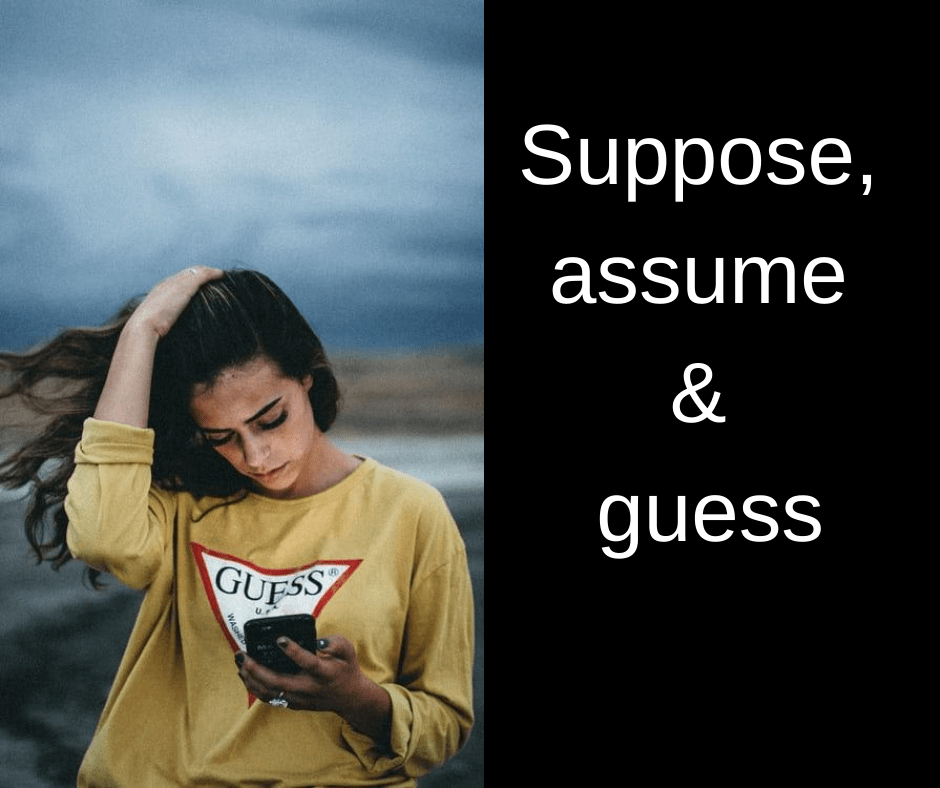
Learn the difference between suppose, assume and guess. We also answer more of your questions and doubts.
Voice message from Isaac from Mexico.
Voice message from Marina from Asturias
X”beside”X – besideS = what’s more, in addition = además
Thank you for spreading the word about our podcast (difundir la palabra, correr la voz)
What’s the difference between suppose, assume and guess?
To Suppose – suponer que (noun = supposition)
To think that something is likely to be true: He’s not answering his phone. I suppose he’s busy.
You think something is true, although you wish that it wasn’t: I suppose we won’t be going on holiday this Christmas.
When you are annoyed: I suppose the builder will be late. I suppose it’ll be hot again tomorrow.
To make polite requests: I don’t suppose there are any more chocolate biscuits?
To be supposed to + infinitive
To have a duty or a responsibility to do something (similar to ‘have to’): I’m supposed to be exercising every day.
You’re supposed to wear a mask for safety reasons.
To explain what a person (or thing) is likely to do: It was supposed to rain yesterday.
We were supposed to go on holiday this year.
Common expressions
I suppose so/not
Suppose I do/don’t?
I don’t suppose you could….? – to ask a favour
Assume – suponer que (noun = assumption)
to make an ass out of u and me!
Assume and suppose can be used interchangeably:
Suppose I was rich enough to give you 10,000 euros. What would you do with it?
Assume/Assuming I was rich enough to give you 10,000 euros. What would you do with it?
However, there can be a difference in meaning:
I suppose you have the key to our flat. (I gave them to you a few months ago)
I assume that you have the keys. (there is no evidence, it’s based on a guess)
We most often use suppose with 1st person in conversations:
“I suppose there will be a podcast published on Sunday.”
We don’t often say, “She supposes you’ll arrive on time.”. However, we often say, “She assumes that you’ll arrive on time.”
What she supposed was true, was in fact the opposite of what really happened.
Common expressions
To assume liability for (the accident)
To assume the position (of head teacher)
To assume a low profile
Guess – adivinar, suponer (noun = guess)
You give an answer to a particular question when you do not have all the facts and so cannot be certain if you are correct:
“I didn’t know the answer, so I had to guess.”
Assume and suppose are similar to guess, but they suggest you have more information. Assume and suppose are often used in a similar way to think.
You can use guess before you tell something interesting or surprising:
“Guess what? Our air conditioner stopped working in August!”
You can use guess and suppose interchangeably when you believe something is true or likely but are not certain:
I guess my sister is having a hard time at the moment.
I suppose my sister is having a hard time at the moment.
Common expressions
I guess you’re right.
Take a guess. (an educated guess)
I guess so/not.
I’ll venture a guess.
It’s anyone’s guess.
Your guess is as good as mine!
What is a guesstimate? (an estimate based on a mixture of guesswork and calculation)
I suppose it is safe to assume that Reza and Craig know what they’re talking about. – Your guess is as good as mine!
…and now it’s your turn to practise your English.
Send us a voice message. https://www.speakpipe.com/inglespodcast
Send us an email with a comment or question to [email protected] or [email protected].
Visit our online store: https://store.mansioningles.net/
Thank you to all of you who are helping us by supporting this podcast. You can see a list of all our Patreon supporters at Patreon.com/inglespodcast
Welcome to our new Patreon supporters who have joined us this month:
Carlos Fernández García
Luisandrea M Coronado
Jose Rs
Paulo Cachadinha
Rafael Matallana
Hestefany
Juan Andrés Cuyás Hernández
Mirsha Ortiz
Jesus Santander
Rodrigo Delgado
Join our Patreon program for as little as $1.21 ish per month (including VAT) and you get instant access to recent transcriptions. https://www.patreon.com/inglespodcast
On next week’s episode: Panama
The music in this podcast is by Pitx. The track is called ‘See You Later’
Photo by Jake Pierrelee on Unsplash


